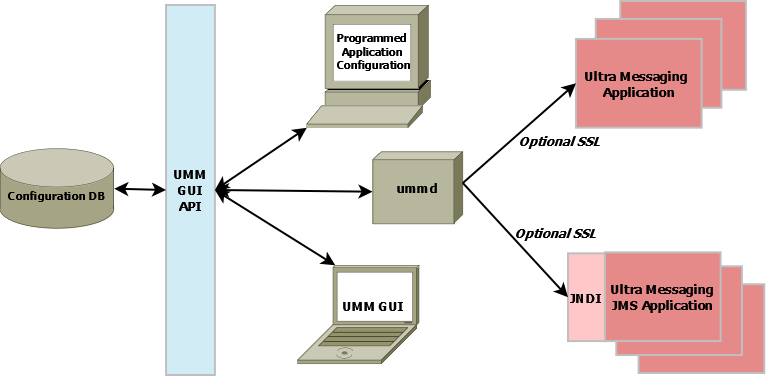2. Ultra Messaging Manager
Some of the highlights of the UM Manager include the following.
-
Implements UM configuration with an XML file(s).
-
Provides a graphical interface (GUI) to create and edit XML configuration files.
-
Allows configuration by topic name, context name, event queue name, or wildcard pattern.
-
Allows restriction of option values to a range or ranges of values.
-
Allows you to restrict the creation of UM objects such as contexts, source topics, receiver topics, event queue names, or wildcard patterns.
-
Lets you define configuration templates, which can overlap and override one another.
-
Provides arbitrary strings of application-data at strategic points in the configuration.
-
Retrieves configuration from a ummd, or via an API call, or via an environment variable (in that order).
-
Preserves the existing UM configuration APIs (
lbm_config(),*_attr_setopt(), etc).
Note: The UM Manager currently supports all UM features except the Hot Failover Across Multiple Contexts (HFX) feature.
Note: The UM Manager does not provide policy enforcement for Spectrum channels. UMM rules apply to topic names, but not to Spectrum channels within a topic name. Moreover, you assign receivers to Spectrum channels with API calls and not UM configuration options.
UMM consists of the following components.
-
UMM GUI - Graphical user interface for creating and editing XML configuration files. The UMM GUI requires Java Version 1.6.x. Communicates with ummd via the UMM GUI API. See Using the UMM GUI.
-
UMM GUI API - Used to create the UM GUI and provides all access to the configuration database. You can use the API to programmatically create and store configuration templates and application configurations, bypassing the UMM GUI. See Using the UMM API and UMM Java API.
-
ummd - Serves XML configuration information and UM license information to UM and Ultra Messaging JMS applications. Communication between ummd and your applications can be secured with SSL. See UM Manager Daemon.
-
Configuration Database - Database that stores all XML configuration files created in the UMM GUI or created programmatically. UMM supports MySQL™ and Oracle® databases using JDBC. See Configuring the UMM Database.
